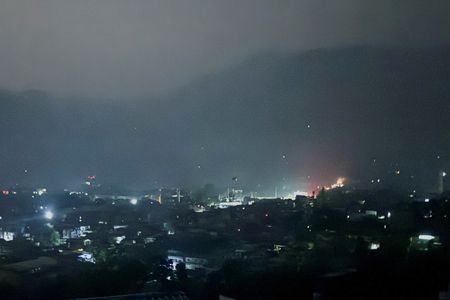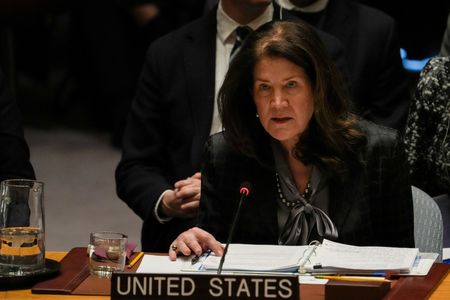By Abhijith Ganapavaram, Ben Blanchard and Ariba Shahid
TAIPEI/NEW DELHI (Reuters) -Airlines including United Airlines and Korean Air re-routed or cancelled flights and about a dozen Indian airports were shut on Wednesday after India struck nine sites in Pakistan, raising fears of an escalation.
India attacked Pakistani Kashmir and Pakistan said it had shot down five Indian fighter jets in the flare-up, which followed an attack by Islamist militants that killed 26 people in Indian Kashmir last month. India said it hit “terrorist infrastructure” related to the tourist killings. Pakistan rejects that it has such camps on its territory.
Images from flight tracking websites showed a long line of airlines passing over Oman, UAE and Kuwait after the attack, raising the possibility of airspace congestion.
Authorities in Pakistan said 57 international flights were in the country’s airspace when India struck. Prime Minister Shehbaz Sharif’s office said India’s action “caused grave danger to commercial airlines” belonging to Gulf countries and “endangered lives”.
India’s civil aviation ministry did not immediately respond to a request for comment on Pakistan’s remarks.
In the last few days, India and Pakistan had shut their airspaces to each other’s airlines. Global airlines like Lufthansa have also been avoiding Pakistan’s airspace.
“If the conflict continues, there is a chance that Pakistan could impose a full airspace closure, as they did from Feb. to Aug. 2019 under similar circumstances,” aviation advisory body OPSGROUP said in a blog post published Wednesday.
Domestic flights in both countries were also disrupted. Three percent of scheduled flights in India and 17% of scheduled flights in Pakistan were cancelled as of 1030 GMT, according to Flightradar24.
India’s top airline IndiGo said it was cancelling 165 flights till Saturday morning. Its shares were down 1.1%. Flights belonging to Air India, SpiceJet and Akasa Air were also cancelled.
Pakistan said its airspace was open following closure after the attacks and that its airports were “fully functional.”
Images from FlightRadar24 showed some civilian jets flying over Pakistan airspace but India’s northwest continued to be deserted.
GPS SPOOFING CONCERN
The changing airline schedules are set to further complicate operations in the Middle East and South Asia regions for carriers, which are already grappling with the fallout from conflicts in the two regions.
A spokesperson for Dutch airline KLM said it was not flying over Pakistan until further notice. Singapore Airlines said it had stopped flying over Pakistani airspace since May 6.
Korean Air said it had begun rerouting its Seoul Incheon–Dubai flights on Wednesday, opting for a southern route that passes over Myanmar, Bangladesh, and India, instead of the previous path through Pakistani airspace.
United Airlines said it had cancelled its flight to Delhi, citing in part “airspace limitations”. The U.S. airline operates one direct flight from Newark to New Delhi.
American Airlines said it made adjustments to its operations to New Delhi and would allow customers impacted by the changes to change their plans without charge.
Thai Airways said flights to destinations in Europe and South Asia would be rerouted starting early on Wednesday morning, while Taiwan’s China Airlines said flights to and from destinations including London, Frankfurt and Rome had been disrupted.
Flights from India to Europe were also seen taking longer routes. Lufthansa flight LH761 from Delhi to Frankfurt took about half an hour more to reach its destination compared to Tuesday, according to FlightRadar24.
The Association of Asia Pacific Airlines voiced concern over the impact of conflicts on airline operations.
“Apart from cost and operational disruption, there are safety concerns as GPS spoofing interfering with flight operations over conflict zones is one of the highest risks the industry faces,” it said in a statement.
GPS spoofing is a malicious technique that manipulates Global Positioning System (GPS) data, which can send commercial airliners off course.
(Reporting by Ben Blanchard, Abhijith Ganapavaram, Dan Catchpole and Ariba Shahid; Additional reporting by Joanna Plucinska in London, Jin Hyun Joo in Seoul, Khanh Vu in Hanoi, Bart Meijer, Shivansh Tiwary and Jun Yuan Yong; Editing by Michael Perry, Raju Gopalakrishnan and Philippa Fletcher)











